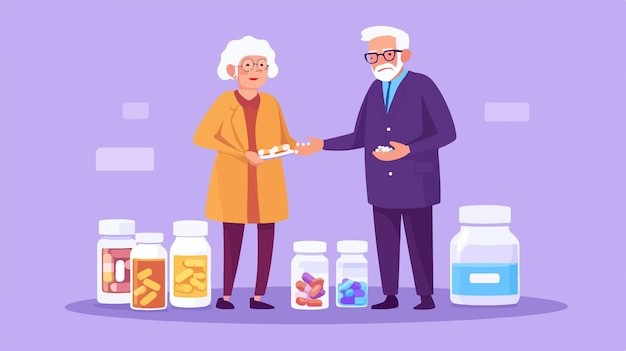Ageing brings a host of changes, both physical and mental. It can complicate routine tasks, including the essential task of managing medications. For seniors, medication is often a lifeline, helping them manage chronic conditions, alleviate symptoms, and improve their overall quality of life. However, medication management can become increasingly challenging due to factors like memory loss, vision impairment, or multiple prescriptions. This is where medication assistance for seniors plays a critical role in ensuring safety, compliance, and overall well-being.
In this blog, we’ll explore the importance of medication assistance, highlight its connection to personal care, and provide practical tips and solutions for families and caregivers.
The Challenges Seniors Face with Medication Management
For seniors, managing medications isn’t always straightforward. Here are some common challenges:
- Polypharmacy
Many seniors take multiple medications for various health issues. Remembering different dosages, schedules, and interactions can be overwhelming. - Cognitive Decline
Conditions like dementia or Alzheimer’s can make it difficult to remember when or how to take medications. - Physical Limitations
Arthritis, tremors, or poor eyesight can hinder seniors from opening pill bottles, reading labels, or measuring doses accurately. - Side Effects and Interactions
Without proper guidance, seniors may struggle to recognize adverse side effects or avoid harmful drug interactions. - Non-Adherence
Seniors may forget doses, take the wrong medication, or stop their regimen altogether due to confusion or lack of understanding.
These challenges can lead to serious consequences, including hospitalization, worsening health conditions, or even life-threatening emergencies.
How Medication Assistance Supports Seniors
Medication assistance goes beyond simply reminding seniors to take their pills. It offers a structured approach to ensure proper administration while addressing their broader physical and emotional needs.
1. Improves Health Outcomes
Proper medication adherence helps seniors manage chronic conditions like diabetes, hypertension, or heart disease more effectively. Regularly taking prescribed medications reduces the risk of complications and promotes a better quality of life.
2. Prevents Medication Errors
Trained caregivers ensure that medications are taken at the right time, in the correct dosage, and in the manner prescribed. This minimizes the risk of accidental overdoses or missed doses. They also monitor for any signs of adverse reactions and promptly address concerns. This proactive approach creates a safer environment, giving families peace of mind.
3. Enhances Emotional Well-being
Knowing that someone is there to assist fosters a sense of security and reduces stress for both seniors and their families. Regular interaction with caregivers also combats feelings of isolation and loneliness. This emotional support helps seniors maintain a positive outlook on life.
4. Provides Personalized Support
Caregivers can tailor medication assistance to suit individual needs, including pill organizers, blister packs, or reminders through technology. They adapt their methods to accommodate physical or cognitive limitations, ensuring the process is seamless. This level of customization enhances the overall caregiving experience.
5. Supports Independence
While medication assistance provides critical oversight, it also empowers seniors to remain as independent as possible in other areas of their lives. By reducing the burden of managing medications, seniors can focus on activities they enjoy. This balance promotes both autonomy and confidence in their daily routines.

The Connection Between Medication Assistance and Personal Care
Medication management often intersects with other aspects of personal care. Seniors who struggle with daily tasks like grooming, bathing, or mobility may find it even more challenging to manage their medications.
Caregivers offering medication assistance for seniors typically provide holistic support that addresses the individual’s overall well-being. For example:
- Grooming and Hygiene: Ensuring a senior feels clean and comfortable helps them maintain their dignity and emotional health, which positively impacts their willingness to stick to medication routines.
- Mobility Assistance: Helping seniors move safely to access their medications reduces risks associated with falls or physical strain.
- Meal Preparation: Certain medications must be taken with food. Caregivers can ensure that meals are prepared on time and in alignment with medication requirements.
This integrated approach to care ensures that seniors receive comprehensive support for their physical and emotional needs.
Practical Tips for Effective Medication Assistance
For families and caregivers, here are some actionable tips to make medication management safer and more effective:
1. Organize Medications
Use pill organizers or blister packs to sort medications by day and time. This simplifies the process and minimizes confusion. Clearly label each section to indicate the specific time for each dose. Regularly check the organizer to ensure medications are refilled on time.
2. Set Up Reminders
Utilize alarms, smartphone apps, or caregiver prompts to ensure timely doses. Choose tools that allow for multiple reminders in a day if needed. Encourage seniors to associate the sound of the alarm with taking their medication to build a habit.
3. Keep a Medication List
Maintain an updated list of all prescriptions, over-the-counter medications, and supplements. Include details like dosages, schedules, and potential side effects. Share this list with healthcare providers during appointments. Keep a copy of the list in an easily accessible place, such as on the fridge or in a daily planner.
4. Communicate with Healthcare Providers
Regularly consult with doctors and pharmacists to review medications, check for interactions, and adjust dosages as needed. Ask specific questions about potential side effects or alternatives if a medication isn’t well-tolerated. Schedule routine medication reviews, especially after hospital visits or changes in prescriptions.
5. Create a Routine
Incorporate medication times into daily routines, such as after meals or before bedtime, to make them easier to remember. Align medication times with activities like morning coffee or evening TV to reinforce the habit. Involve caregivers or family members in monitoring the routine to ensure consistency.
6. Involve Professional Caregivers
Enlisting the help of trained caregivers can provide peace of mind and ensure medications are managed professionally. Caregivers can also observe seniors for any side effects or health changes and report them promptly. This support allows families to focus on quality time with their loved ones instead of worrying about medication adherence.
Solutions for Families Seeking Support
Managing medications can feel like a daunting task for families, especially when balancing work and caregiving responsibilities. Professional home care services can bridge the gap, offering reliable support tailored to the unique needs of each senior.
One excellent solution is SD Home Care’s Medication Assistance Services. Their trained caregivers provide comprehensive medication management, from setting up schedules to ensuring proper administration. By partnering with SD Home Care, families can ensure their loved ones receive the care they need to thrive.


